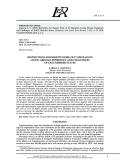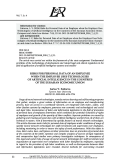In the context of sanctions pressure on Russia the issues of import substitution in the field of digital technologies are getting even more urgent. Highly qualified specialists with respective competencies are in short demand in the country. The government take some measures to that end, but they can solve all the problems. Engagement of required specialists from abroad - those working on a remote basis - could improve the situation. However, there are certain unresolved issues in the labor legislation of the Russian Federation and some other countries, including members of international economic integration organizations such as the Eurasian Economic Union that hinder this process. Identification of hindrances and restrictions preventing free movement of human resources in EAEU member states and efficient use of remote work in the field of IT is what this paper is dedicated to. To that end the actual situation unfolding in the labor market of the field of IT on the territory of EAEU member states has been analyzed, and so has been labor and other legislation of member states regulating the labor of remote workers and the academic literature and papers published in the periodicals. The system analysis and comprehensive review of sources and comparative legal studies have become the main methods of research. As a result, legal and organizational restrictions preventing efficient application of remote work of IT specialists typical for some or even all EAEU member states have been identified. Also, there have been suggested some ways to overcome the identified restrictions that can be implemented by adopting new legal provisions or by amending the existing ones.
Usage of neural network technologies, namely various learning and self-learning programs that gather, analyze a great volume of information on an employee and manufacturing process, have an access to a worldwide network, are integrated with video-, audio-, and other fixation systems by employers generates new economic and technological and social and legal risks. Inconsistence of labor and information legislation in the field of protection of personal data of employees determines novel conditions for potential violations of rights of employees and growth of the quantity of labor conflicts. Separate problems are caused by gathering and treating personal data with artificial intelligence and far from all of them are technical in nature, even if determined by specific features of neural network technologies. This article discusses main risks for personal data of employees under conditions of usage of specific neural network technologies for staff recruitment and supervision over employees, including monitoring in order to ensure the safety of work performance. With this object in view, labor codes, laws, and bylaws on labor protection, laws on protection of personal data of the countries of the EAEU. Systemic and complex analysis of sources of legal regulation and comparative legal studies were primary investigative techniques. In consequence of this, legal and social risks of usage of neural network technologies for staff recruitment and organization of supervision over compliance with labor discipline by employees, especially in regard to the provision of safe labor conditions, as well as discrepancies between labor and information legislations were revealed. Several methods for overcoming revealed discrepancies, which allow to ensure a proper protection of employees’ rights in the field of protection of personal data before long, were proposed.

